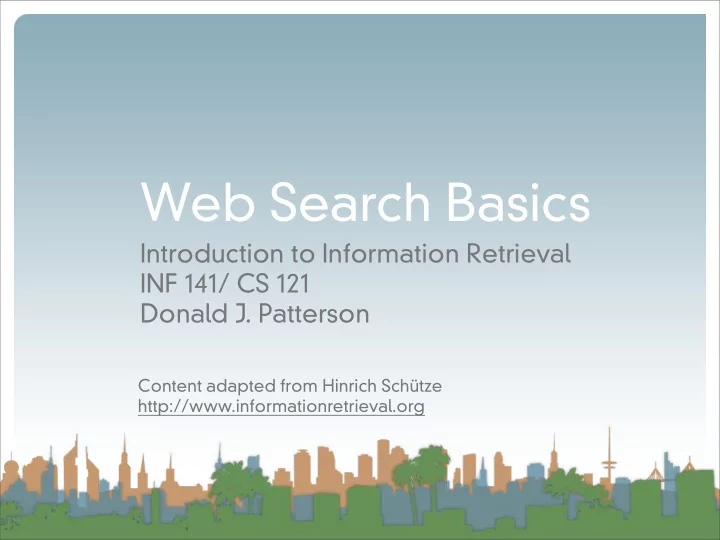

Web Search Basics Introduction to Information Retrieval INF 141/ CS 121 Donald J. Patterson Content adapted from Hinrich Schütze http://www.informationretrieval.org
Overview Overview • Introduction • Classic Information Retrieval • Web IR • Sponsored Search • Web Search Basics • Size of the Web • Web Users • Spam
Classic Information Retrieval Classic IR assumptions • Corpus: Fixed document collection • Goal: Retrieve information content relevant to information need
Classic Information Retrieval Classic IR Goal • Classic “Relevance” • For each query, Q, and stored document, D, in a corpus there exists a relevance score: R(Q,D) • R(Q,D) is averaged over users, U, and contexts, C • Maximize R(Q,D) instead of R(Q,D,U,C) • Context is ignored • Individuals are ignored • Corpus is static
Overview Overview • Introduction • Classic Information Retrieval • Web IR • Sponsored Search • Web Search Basics • Size of the Web • Web Users • Spam
Web Information Retrieval Web IR: Differences from traditional IR • On the web, search and ads are intricately connected • The web is huge • The web is a rapidly changing collection. • There is spam on the web • Adversarial IR • Huge difference from traditional IR • One interface for hugely divergent needs • Queries, Maps, Stocks, Weather, Calculations
Web Information Retrieval History • Early keyword-based engines • (1995-1997) Altavista, Excite, Infoseek, Inktomi • Paid placement ranking • Goto.com -> Overture.com -> Yahoo! • Results based on auction for keyword placement
Web Information Retrieval History • (1998+) Link-based ranking pioneered by Google • Links added the idea of “authoritativeness” to “relevance” • Blew away all early engines save Inktomi • Great user experience looking for a business model • Meanwhile Goto/Overture’s annual revenues were nearing $1 billion
Web Information Retrieval History • Result • Google: • Added paid placement ads on the side • Differentiated from search results • Yahoo! built a similar architecture • Buys Overture for paid placement • Buys Inktomi for search
Overview Overview • Introduction • Classic Information Retrieval • Web IR • Sponsored Search • Web Search Basics • Size of the Web • Web Users • Spam
Sponsored Search Ads Ads Algorithmic Results
Sponsored Search Ads vs. Search Results • Google has maintained that ads (based on vendors bidding for search queries) do not affect vendors ranking in search results
Sponsored Search Ranking of ads • Other search engines (Yahoo!, MSN) have made similar statements on occasion • Any of them can change at any time • Facebook is currently testing the waters in their “Newsfeeds” • We will ignore the possibility of paid placement ads being interspersed in search results.
Sponsored Search Ranking of ads • Goto model: • Rank according to how much advertiser pays • Current model: • Balance auction price and relevance • Irrelevant ads (few click-throughs) • Decrease opportunities for relevant ads • Harm the user experience • Idea: Well-targeted advertising is good for everyone
Sponsored Search Paying for advertisements • CPM • “Cost Per Mil” • Pay for 1000 eyeballs • Important for branding campaigns • CPC • “Cost per Click” • Pay for clicking on ads • Important for sales campaigns
Overview Overview • Introduction • Classic Information Retrieval • Web IR • Sponsored Search • Web Search Basics • Size of the Web • Web Users • Spam
Web Search Basics The Web Corpus • No design/coordination • Distributed content creation, linking • “Democratization of publishing” • Content includes truth, lies, contradictions, etc. • Unstructured Data (text, html) • Semi-Structured (XML, annotated photos) • Structured (Databases) The Web • Scale is much larger than previous text corpora
Web Search Basics The Web Corpus • Growth - slowing from “doubling every few months”, but still expanding The Web
Web Search Basics Dynamic Content • Content can by dynamically generated • There is no static html version • Flight status information, evite responses • Assembled on request (“?” in URL is a clue) The User flickr:crankyT Flight AA715 Browser Application Server Databases
Web Search Basics Dynamic Content • Most (truly) dynamic content is ignored by web spiders • Too much to index • Static information is more important for search • Spider Traps look dynamic • Actually a lot of “static” content is assembled on the fly also • ASP, PHP, JSP, ads, etc....
Recommend
More recommend